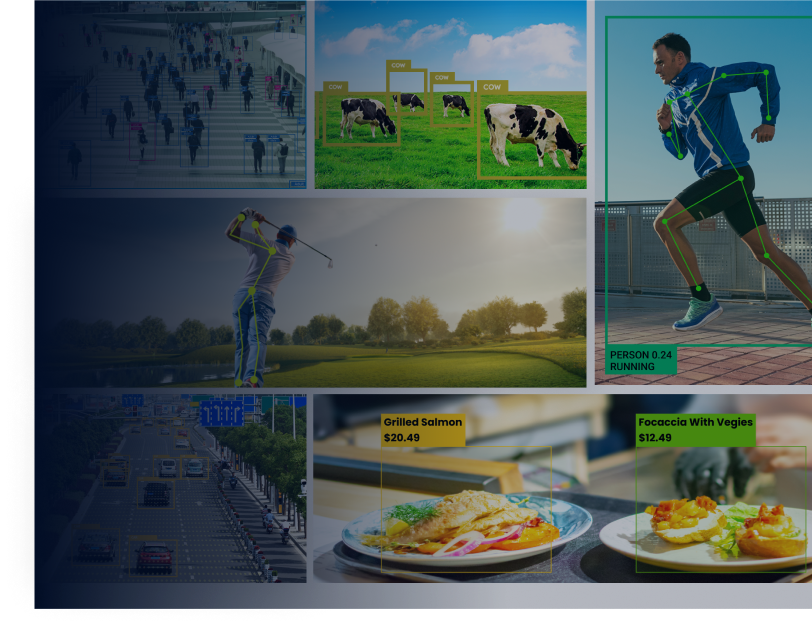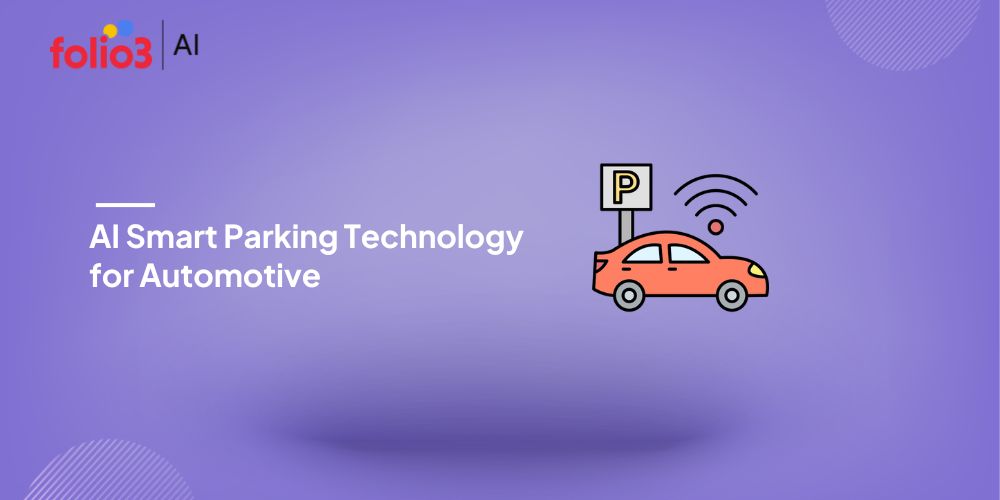As of 2024, there are closer to 1.5 billion cars in the world. With busy cities and heavy traffic, finding a parking spot can be exhausting and time-consuming.
Even if you manage to locate one, you still need to deal with the issue of improperly parked vehicles, which increases the risk of accidents occurring in parking lots.
However, there exists a solution that can simplify and enhance safety in parking—the invention of AI smart parking technology.
This technology has advanced sensors and computer vision to help drivers locate empty parking spots quickly. It uses real-time data from cameras mounted on streetlights, buildings, or other structures.
What Exactly is AI-based Smart Parking?
Automated systems that identify open parking spaces are known as AI-based smart parking systems. It makes use of machine learning algorithms, cameras, and sensors to help it comprehend its environment. Real-time data generation also helps it maintain track of available parking spots.
The technology not only helps drivers find a vacant space quickly but also reduces the time spent driving around in search of one.
AI smart parking technology is linked to various IoT devices and uses the information gathered from these devices to inform users of available parking spots.
Additional helpful information is also given, such as parking rates, making the process even more convenient.
Technologies Supporting Intelligent Parking
-
Deep learning:
Deep learning is a subset of machine learning; these systems imitate humans and, just like them, gain knowledge from experience. The more data they collect and use, the more accurate they become.
The data collected by these systems are used to create accurate 3D models of the surroundings, enable real-time monitoring of available parking spaces, and predict potential dangers.
Deep learning algorithms have a high degree of accuracy in detecting objects, which allows them to effectively recognize and classify vehicles in busy traffic.
-
Computer vision
Computer vision uses information from parking lot cameras to locate open parking spaces.
AI smart parking technology usually operates by identifying the marks on an empty parking lot and verifying their conclusions using geometric data to provide more precise results.
This technology is demonstrated well by the Harris Corner Detector (HCD). The HCD uses panoramic photos to identify the corners and size of each parking space.
Then, it automatically allocates the available parking spaces to cars with the appropriate proportions.
-
Ground sensors
Ground sensors use radar technology to assess whether or not a parking space is available.
These sensors are positioned in critical locations and work throughout the parking lot floor.
Then, the system identifies the area occupied when a car drives over the sensor, which relays the information to it.
-
Parking ticket machines
These outdated smart parking technologies usually operate by counting the number of vehicles entering or leaving a parking lot.
These machines use this information to determine the availability of parking spaces and display it on electronic boards for drivers to access.
However, this technology is not as reliable or efficient as AI smart parking technology. The former is prone to errors, which can inconvenience drivers who rely on their accuracy.
AI Smart Parking Benefits for Drivers
The challenge of providing sufficient parking space for the growing number of vehicles is becoming more prominent.
AI smart parking technology comes with an innovative solution.
This technology alone can monitor each car, which sounds easy, but with a billion urbanization and continuously growing, it is hectic.
You can understand how trained this technology is with deep and machine learning models to keep track of cars and quickly locate vacant spots to reduce congestion and enhance safety.
Below are the benefits of an AI-based smart parking system for drivers:
-
Decrease in Street Search Activity
AI smart parking eliminates the stress of drivers driving around in search of parking spaces.
Drivers can efficiently navigate to available spots, decreasing the time spent on the lookout.
They can also get a space convenient for them, so if they want to stay in the car, it is easy to wait.
-
Less Fuel Usage
Sometimes people have to wait in long queues only to discover that there is no available parking space. In other words, it is essentially a waste of fuel.
Given the current fuel prices, a considerable sum of money is lost.
Smart parking solutions save time by informing the driver whether the space is available or not, eventually reducing the unnecessary use of your vehicle.
-
Lowered parking anxiety
Yes, parking anxiety is real, and it mentally affects people because parking can be difficult in a congested area.
AI smart parking technology helps reduce stress by efficiently navigating the driver to available spots.
Once the vehicle is in a secure location, drivers can make use of their saved time to do something productive, like run errands or attend meetings, without worrying about their vehicle’s safety.
This diminishes the need for you to search for parking by vehicle detection.
AI Smart Parking Benefits for Businesses
Surface parking lots cover approximately 5% of the urban landscape in the US.
It means that companies will face more competition to find a parking space for their employees and customers.
With that in mind, let’s look at some of the benefits businesses can gain from AI smart parking technology.
-
Capacity Management
With smart AI technology, businesses can accurately count the number of occupied and vacant parking spaces in real time.
This data allows for more efficient capacity monitoring, better peak-hour planning, and overall improvement.
This not only helps minimize congestion in the parking lot but also ensures that customers and employees have a convenient experience when visiting.
-
Better Customer Service
Businesses may track which areas have the most and least parking traffic by using data gathered from various sensors placed around the streets and parking lots.
Using this data, they can make better decisions about where to expand or reduce activities.
Thanks to sensor data, businesses can also monitor the unauthorized use of designated parking spaces and emergency access roads.
-
Identifying Ineffective Parking Lot Management Practices
The maintenance of a parking lot requires a lot of work. For instance, parking lot managers frequently need to deal with irregularly and illegally parked automobiles or monitor the length of time a certain car is parked.
They can precisely calculate how long each vehicle will be parked using data from the on-site cameras.
Future Trends That Will Affect AI Smart Parking
The fluctuating demand for parking lots poses challenges for numerous cities.
That is because areas near busy roads and major buildings such as hospitals and supermarkets require help accommodating visitors.
As a result, cities are developing different technologies to address this issue, and we will see an impact on how we park our cars in the future. These include:
-
Autonomous parking garages
Automated parking lots have gained popularity in contrast to conventional parking lots. These systems use technology to lift and park the vehicle.
It eliminates the demand for human assistance to move the car to an appropriate parking space. Now, anyone can park their vehicle in a designated section.
-
Self-Driving Vehicles
A self-parking feature is already present in many cars. With these features, an individual can park their vehicles without being in the driver’s seat.
As a result, the parking procedure is expedited, and parking spaces are used more effectively.
If anybody lacks safe parking, vehicle detection can be used; this feature will help to reverse and navigate crowded parking lots comfortably.
-
Internet of Things (IoT)
The parking industry has greatly benefited from IoT technology. Drivers can view every open parking space long before they arrive, greatly cutting down on the time it takes to seek a spot.
IoT in parking has advantages beyond simply assisting vehicles in finding parking spaces.
Additionally, these technologies assist businesses in advertising their services on several websites and apps.
Growing Contribution of Mobile Apps to AI-Based Parking Systems
You can now easily access this beneficial parking technology thanks to mobile apps. Some parking-related apps make routine parking simpler by reserving parking spaces.
Drivers can use this service to pay in advance for parking spaces.
Additionally, it provides the convenience of allowing you to modify your reservations if your plans suddenly change.
The applications make hassle-free payments available, but they’re also excellent tools for direction.
Conclusion
Artificial intelligence has transformed numerous industries, and the parking industry is no exception. Given the growing number of parking lot challenges, smart parking optimization using AI technology is the only way to speed up the process of finding parking spaces and, eventually, improve parking efficiency.
We’re likely to witness a big change in how we park and use parking space in cities as more cities in the US and other countries now implement AI smart parking technology.

Dawood is a digital marketing pro and AI/ML enthusiast. His blogs on Folio3 AI are a blend of marketing and tech brilliance. Dawood’s knack for making AI engaging for users sets his content apart, offering a unique and insightful take on the dynamic intersection of marketing and cutting-edge technology.










